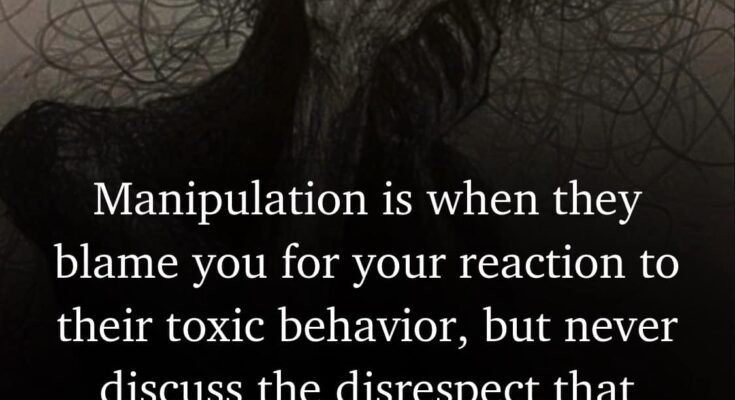The Hidden Dynamics of Script Manipulation: Understanding Toxic Behavior in Relationships
By: [Cr 24h]
In today’s fast-paced world, interpersonal relationships—whether personal or professional—can often become complicated. One particularly insidious aspect of these dynamics is what psychologists refer to as “script manipulation.” This term describes a scenario where individuals deflect responsibility for their toxic behavior by blaming their victims for their reactions, creating a cycle of confusion and distress.
What is Script Manipulation?
At its core, script manipulation occurs when someone engages in disrespectful or harmful behavior, then turns the tables, making the victim feel guilty for reacting to that behavior. For instance, if an individual consistently belittles a colleague’s ideas, and that colleague finally expresses frustration, the belittler may respond by claiming that the frustration is inappropriate or overblown. This tactic not only invalidates the victim’s feelings but also obscures the original disrespect that prompted the reaction.
The Cycle of Blame
The cycle of blame can lead to a toxic environment where victims second-guess their emotions and become increasingly isolated. According to Dr. Jane Smith, a clinical psychologist, “Script manipulation is a common defense mechanism for individuals who refuse to take responsibility for their actions. It allows them to maintain control while undermining the emotional wellbeing of others.”
Victims of script manipulation may experience self-doubt, anxiety, and even depression as they grapple with the dissonance between their experiences and the narrative imposed upon them by the manipulator.
Recognizing Toxic Patterns
Recognizing script manipulation is crucial for breaking free from its grasp. Here are some signs to look out for:
- Deflection: When confronted, the manipulator shifts the conversation to the victim’s reaction instead of addressing the original behavior.
- Gaslighting: The manipulator may deny their actions or suggest that the victim is overreacting or imagining things.
- Emotional Exhaustion: The victim may feel drained after interactions, often questioning their own perceptions and feelings.
Breaking the Cycle
Breaking the cycle of script manipulation requires awareness and assertiveness. Here are a few strategies:
- Set Boundaries: Clearly communicate what behaviors are unacceptable and stand firm on those boundaries.
- Document Interactions: Keeping a record of conversations can provide clarity and validation during moments of doubt.
- Seek Support: Talking to trusted friends or professionals can help victims navigate their feelings and gain perspective.
Conclusion
Script manipulation is a powerful tool in the hands of those who refuse to acknowledge their toxic behavior. By understanding its dynamics, victims can reclaim their narrative, fostering healthier and more respectful relationships. Awareness is the first step toward empowerment, allowing individuals to break free from the cycle of blame and cultivate a more positive environment for themselves and those around them.
In a world where respect and communication are paramount, it is essential to confront and challenge script manipulation, ensuring that every voice is heard and valued.



